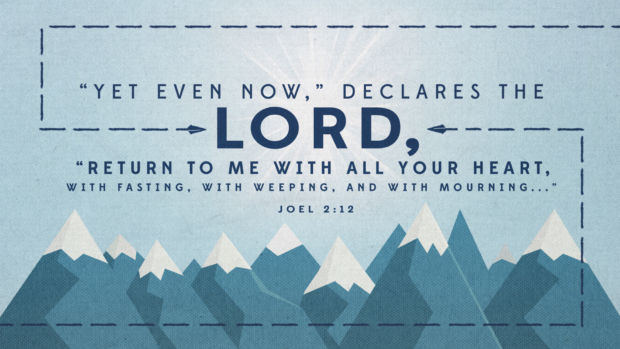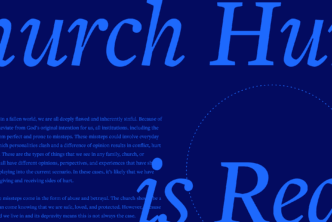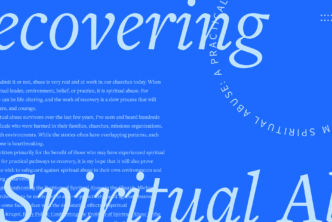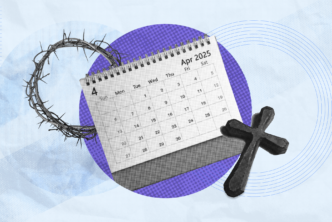A few years ago as I was exploring spiritual disciplines, I found myself surprised at how often fasting came up. Fasting wasn’t something I heard much talked about in the churches and communities I’d been a part of. But it kept coming up. In reading the prophets and the Gospels, it seemed that fasting was something God expected of his people. Though I have yet to make fasting a regular practice, it’s a discipline I have felt invited into, tried to implement, and remain curious about.
As Christians, what are we to make of fasting? Is it something we should incorporate along with our times of biblical meditation and prayer? What are the spiritual benefits of fasting? And, if we decide to fast, how might we begin?
- What is fasting?
- What fasting is not
- Is fasting considered a spiritual discipline?
- What does the Bible say about fasting?
- Verses about fasting
- Why should I fast?
- How do I start fasting?
- Books on fasting and praying
What is fasting?
A quick internet search on fasting produces a myriad of health-related results, with intermittent fasting ranking at the top. The concern here is on the physical benefits of fasting, such as weight loss. If you alter your search to “spiritual fasting” or “religious fasting,” you will find religious fasting is less concerned with the health of the body than that of the soul. You will also find that Christianity is not the only religion to practice fasting, so we need to modify our question: What is Christian fasting?
We’ll get to that later. For now, in its simplest form, fasting is the act of abstaining, or as one medical journal terms it “the science of going without.”1
This abstention is generally from food, but fasting can include other things as well.
Adele Calhoun writes in her Spiritual Disciplines Handbook:
Fasting is an opportunity to lay down an appetite—an appetite for food, for media, for shopping. This act of self-denial may not seem huge—it’s just a meal or a trip to the mall—but it brings us face to face with the hunger at the core of our being. Fasting exposes how we try to keep empty hunger at bay and gain a sense of well-being by devouring creature comforts. Through self-denial we begin to recognize what controls us. Our small denials of the self show us just how little taste we actually have for sacrifice or time with God.2
What fasting is not
Because fasting from food has an obvious physical component to it, we are to be careful about our approach. It is important to remember what fasting is not. Fasting is not:
- a diet to improve health
- a program to lose weight
- a means to absolve ourselves of the guilt of sin(s)
- a way to punish or maltreat the body
- a hunger strike to make a statement
- a demonstration of your holiness to others
- a technique to earn God’s favor
This applies whether fasting from food or things other than food.
As a final point, it is important to remember that fasting does not apply to things we should avoid at all times. For example, we are exhorted to abstain from sin always. Fasting is a temporary exercise; we should (at least try to) abstain from sin and evil on a permanent basis; therefore, we don’t “fast” from sin. Everything worth fasting from is, like food and drink, good in itself. What’s more, we don’t have to be sinning with these things—for example, by committing gluttony—in order to fast from them. We can have a completely healthy relationship with food and drink and still choose to set them aside for a fast. When we fast, we are not setting aside something evil for something good; rather, we are setting aside a lesser good for a higher good.
As we’ll discuss later, there are many different types and ways to fast. There’s not one way or a prescribed length of time. It is a matter of both discipline and discernment, taken up by an individual or a community.
Is fasting considered a spiritual discipline?
There are many ways we can be formed spiritually, both intentionally and unintentionally. The spiritual disciplines offer intentional ways we can pursue formation. They are practices that can help us grow individually and corporately, in internal and external ways. They are exercises that further our spiritual growth and our relational growth.
Calhoun writes:
From its beginning the church linked the desire for more of God to intentional practices, relationships and experiences that gave people space in their lives to “keep company” with Jesus. These intentional practices, relationships and experiences we know as spiritual disciplines.3
As Paul writes in his letter to the Romans, “Do not be conformed to this world, but be transformed by the renewal of your mind, that by testing you may discern what is the will of God, what is good and acceptable and perfect” (Rom 12:2). Spiritual disciplines, such as fasting, can be helpful tools that the Holy Spirit uses in our lives for our transformation and renewal.
However, spiritual disciplines are not tools we can wield to force God, ourselves, or others to do what we will when we will, to make ourselves change, or convince God that we deserve a reward. In Calhoun’s words: “Spiritual practices don’t give us ‘spiritual brownie points’ or help us ‘work the system’ for a passing grade from God. They simply put us in a place where we can begin to notice God and respond to his word to us,” and, “Our desires don’t obligate the holy One. God is free to come to us in spiritual disciplines as he wills, not as we demand.”4
What does the Bible say about fasting?
The Lexham Bible Dictionary defines fasting as “a ritual of abstaining from food and/or drink for a predetermined period” and notes that it was “practiced in the Bible primarily as a means of mourning” and often “in response to suffering or disaster, in conjunction with other mourning rituals” in the Old Testament.

The Factbook [Logos > Tools > Factbook] in the free Logos Bible app for mobile, web, and desktop is a great tool to use here to explore fasting and what the Bible tells us. The Factbook pulls together the customs, biblical senses, key Bible passages, and other resources in one convenient location.
In the New Testament, we find more examples of fasting. Jesus fasts for forty days and nights prior to beginning his public ministry (see Matt 4, Mark 1, Luke 4). In the Sermon on the Mount, Jesus’s teaching on fasting follows that of prayer and forgiveness. Just as he says “when you pray,” he says “when you fast,” implying that this is something that was current practice as well as expected of those who follow him:
And when you fast, do not look gloomy like the hypocrites, for they disfigure their faces that their fasting may be seen by others. Truly, I say to you, they have received their reward. But when you fast, anoint your head and wash your face, that your fasting may not be seen by others but by your Father who is in secret. And your Father who sees in secret will reward you. (Matt 6:16–18)
While Jesus’s teaching did not do away with fasting, Jesus’s disciples seem to have modified their regular Jewish fasting practices in observance of Christ’s earthly presence with them. Mark records an episode where both Pharisees and disciples of John the Baptist were engaged in fasting, yet Jesus and his disciples were not. When questioned why his disciples did not fast, while John’s disciples and the Pharisees’s disciples did, Jesus responded: “Can the wedding guests fast while the bridegroom is with them? As long as they have the bridegroom with them, they cannot fast. The days will come when the bridegroom is taken away from them, and then they will fast in that day” (Mark 2:18–20). Jesus is not saying the traditional Jewish fasting practices here were wrong, but he is saying something about himself: namely, that he is one greater than either John or the Pharisees. He is the Bridegroom; therefore, a feast is in order, not a fast.
After Jesus ascended, we find mentions in Acts of his followers fasting. Fasting is there mentioned as practiced in conjunction with prayer (Acts 10:30), worship (Acts 13:2), and when appointing and equipping people for service to the Lord: “And when they had appointed elders for them in every church, with prayer and fasting they committed them to the Lord in whom they had believed” (Acts 14:23). So the disciples abstained from fasting while Jesus was with them, and they took up the practice again when he was no longer with them.
For an exploration of the Hebrew and Greek usages of fasting, check out the Bible Word Study guide in Logos (Logos > Guides > Bible Word Study).
More verses about fasting
As we saw above, the Bible speaks of fasting in individual and communal contexts, for petition and repentance and mourning, for worship and anointing to service. Here are a few more examples:
“Then all the people of Israel, the whole army, went up and came to Bethel and wept. They sat there before the Lord and fasted that day until evening, and offered burnt offerings and peace offerings before the Lord.”
—Judges 20:26
“Then Samuel said, ‘Gather all Israel at Mizpah, and I will pray to the Lord for you.’ So they gathered at Mizpah and drew water and poured it out before the Lord and fasted on that day and said there, ‘We have sinned against the Lord.’”
—1 Samuel 7:5–6
“David therefore sought God on behalf of the child. And David fasted and went in and lay all night on the ground.”
—2 Samuel 12:16
“All the valiant men arose and took away the body of Saul and the bodies of his sons, and brought them to Jabesh. And their buried their bones under the oak of Jabesh and fasted seven days.”
—1 Chronicles 10:12
“Then Jehoshaphat was afraid and set his face to seek the Lord, and proclaimed a fast throughout all Judah.”
—2 Chronicles 20:3
“Then I [Ezra] proclaimed a fast there, at the river Ahava, that we might humble ourselves before our God, to seek from him a safe journey for ourselves, our children, and all our goods. … So we fasted and implored our God for this, and he listened to our entreaty.”
—Ezra 8:21, 23
“And in every province, wherever the king’s command and his decree reached, there was great mourning among the Jews, with fasting and weeping and lamenting, and many of them lay in sackcloth and ashes.”
—Esther 4:3
“But I, when they were sick—I wore sackcloth; I afflicted myself with fasting; I prayed with my head bowed on my chest.”
—Psalm 35:13
“Is not this the fast that I choose: to loose the bonds of wickedness, to undo the straps of the yoke, to let the oppressed go free, and to break every yoke?”
—Isaiah 58:6
“So you are to go, and on a day of fasting in the hearing of all the people in the Lord’s house you shall read the words of the Lord from the scroll that you have written at my dictation. You shall read them also in the hearing of all the men of Judah who come out of their cities.”
—Jeremiah 36:6
“Consecrate a fast; call a solemn assembly. Gather the elders and all the inhabitants of the land to the house of the Lord your God, and cry out to the Lord.”
—Joel 1:14
“Then the disciples came to Jesus privately and said, ‘Why could we not cast it [the demon] out?’ He said to them, ‘Because of your little faith. … But this kind never comes out except by prayer and fasting.’”
—Matthew 17: 19–21
“And there was a prophetess, Anna. … She did not depart from the temple, worshiping with fasting and prayer night and day.”
—Luke 2:36–37
Now that we’ve looked at what fasting is and what the Bible says about it, let’s explore why we might fast.
Why should I fast?
Note that in Jesus’s teaching, he does not say, “if you fast” but “when.” David laments, “when I wept and humbled my soul with fasting” (Ps 69:10). Many people in the Bible and throughout church history have fasted and written about its merits: David, Esther, Daniel, Anna, Jesus, and the apostles, just to name a few. From Augustine’s treatise “On the Usefulness of Fasting” to Thomas Aquinas’ Summa Theologica to John Calvin’s Institutes of the Christian Religion, fasting has been considered part of the Christian walk and a common practice.
Aquinas attributes this to Augustine: “Fasting cleanses the soul, raises the mind, subjects one’s flesh to the spirit, renders the heart contrite and humble, scatters the clouds of concupiscence, quenches the fire of lust, kindles the true light of chastity.”5
If even one of these attributes were the result of fasting, it would be a worthwhile practice for us to pick up.
Calvin, in his Institutes, echoes the purpose of fasting when he writes, “Holy and lawful fasting has three objectives. We use it either to weaken and subdue the flesh that it may not act wantonly, or that we may be better prepared for prayers and holy meditations, or that it may be a testimony of our self-abasement before God when we wish to confess our guilt before him.”6
The point, for Calvin and others, is not the fast itself but what it opens us up to, such as a spirit that is “more eager and unencumbered for prayer.”7
Because God is concerned with all of us—heart, mind, soul, and body (Rom 12:1)—fasting can be a helpful practice for our awareness of ourselves, our physicality and weaknesses, of where we are tempted, and of what and who we place our trust in. In creating such awareness, our goal is not to castigate ourselves but to consider the depths of our need for God. Fasting, then, is an act of reliance and trust—we give up or set aside something for a period, and we ask God for his sustenance, as Jesus did when he was in the wilderness or when he went away to be by himself with his Father. Any benefit we receive from fasting is a gift from God, determined by him. Our goal in fasting, or in any other spiritual discipline, is never to earn rewards or favor.
Calhoun cautions us, “We miss the point and endanger our souls when we think of spiritual disciplines as ends in themselves. … They are never the ‘be all and end all’ of discipleship. The ‘be all and end all’ is a loving trust of and obedience to the God who is within us yet beyond us and our very best efforts.”8
In his classic work, Celebration of Discipline: The Path to Spiritual Growth, Richard Foster recognized the challenges fasting presents to us when he wrote, “perhaps in our affluent society fasting involves a larger sacrifice than the giving of money.”9
What does it look like to enact this self-denial? Let’s look at some examples of how to fast.
How do I start fasting?
For those who are new to the discipline of fasting, there are helpful guides available, such as in Celebration of Discipline and the Spiritual Disciplines Handbook. We’ll highlight a few types of fasting, as well as some resources you might explore.
“Normal” fasting
The traditional fast is a period of time when we go without any food. Foster writes, “In Scripture the normal means of fasting involves abstaining from all food, solid or liquid, but not from water. In the forty-day fast of Jesus, we are told that ‘he ate nothing’ and that toward the end of the fast ‘he was hungry’ and Satan tempted him to eat, indicating that the abstaining was from food but not from water (Luke 4:2). From a physical standpoint, this is what is usually involved in a fast.”10
Partial fasting
Foster goes on to discuss an example of a partial fast:
Sometimes what could be considered a partial fast is described; that is, there is a restriction of diet but not total abstention. Although the normal fast seemed to be the custom of the prophet Daniel, there was a three-week period in which he declares, ‘I ate no delicacies, no meat or wine entered my mouth, nor did I anoint myself at all’ (Dan. 10:3).”11
Absolute fasting
Foster also provides examples from the Bible of absolute fasting, which is abstaining from both food and water completely. This type of fasting requires much discernment before entering into it. As Foster says,
[This type of fast] appears to be a desperate measure to meet a dire emergency. Upon learning that execution awaited herself and her people, Esther instructed Mordecai, “Go, gather all the Jews … and hold a fast on my behalf, and neither eat nor drink for three days, night or day. I and my maids will also fast as you do” (Esther 4:16). Paul engaged in a three-day absolute fast following his encounter with the living Christ (Acts 9:9). Since the human body cannot go without water much longer than three days, both Moses and Elijah engaged in what must be considered supernatural absolute fasts of forty days (Deut. 9:9, I Kings 19:8). It must be underscored that the absolute fast is the exception and should never be engaged in unless one has a very clear command from God, and then for no more than three days.12
Fasting for beginners
“As with all the Disciplines, a progression should be observed; it is wise to learn to walk well before we try to run,” says Foster.13
You might start with fasting from one meal during a twenty-four hour period and gradually work up to longer periods. For example, you might eat breakfast and dinner, but not lunch. After attempting that, you might move to fasting from two meals during a twenty-four hour period. After trying this once a week for a few weeks, you might find yourself ready to try a normal fast where you go without food for twenty-four hours.
Foster shares, “In the beginning you will be fascinated with the physical aspects of your experience, but the most important thing to monitor is the inner attitude of the heart. Outwardly you will be performing the regular duties of your day, but inwardly you will be in prayer and adoration, song, and worship.”14
He advises during your normal fast to “Drink only water but use healthy amounts of it. … You will probably feel some hunger pangs or discomfort before the time is up. That is not real hunger; your stomach has been trained through years of conditioning to give signals of hunger at certain hours. … You are to be the master of your stomach, not its slave. If [your schedule permits it], devote the time you would normally use eating to meditation and prayer.”15
Another practical reminder comes from Calhoun, “Don’t break your fast with a huge meal. Eat small portions of food. The longer the fast, the more you need to break the fast gently.”16
Community fasts
Another option might be to join in a community practice, such as Lent, when you have the encouragement of others engaging in the same practices and where fasting is joined by the traditions of prayer and almsgiving. Lent is a time in the church calendar set aside for repentance and preparation, leading up to Easter. Throughout Lent are days of regular fasting (no meals) and partial fasting (no meat). Additionally, some take on the practice of giving something up or taking something on during the season.
- God Is on the Cross: Reflections on Lent and Easter
- Journey to the Cross: A 40-Day Lenten Devotional
At other times unrelated to the church calendar, communities might engage in a fast when they are seeking to hear from God about a particular matter. They might set aside one day per week where the community agrees to fast and spend time in prayer together.
Fasting and justice
God has strong words for those who perform outward acts but do not live according to his Word. In Isaiah 58, we find his response to those who fast outwardly but are not living rightly, those who are oppressing others. They ask God to acknowledge their fasting, but they are thinking not of him or others but of themselves. God responds:
Is not this the fast that I choose:
to loose the bonds of wickedness,
to undo the straps of the yoke
to let the oppressed go free,
and to break every yoke?
Is it not to share your bread with the hungry
and bring the homeless poor into your house;
when you see the naked, to cover him,
and not to hide yourself from your own flesh?
God says if his people practice this kind of fast, that he will answer:
Then you shall call, and the Lord will answer;
you shall cry, and he will say, “Here I am.”
To study this passage more, you might use the Basic Bible Study workflow in Logos (Logos > Guides > Workflows > Basic Bible Study).
Fasting and prayer
Many examples in the Bible link fasting and prayer. Nehemiah says, “I continued fasting and praying before the God of heaven” (Neh 1:4). Anna the prophetess was described as “worshiping with fasting and prayer night and day” (Luke 2:37). Before Barnabus and Saul began their missionary journey, other prophets and teachers fasted and prayed before laying their hands on them and sending them off (Acts 13:3).
As we’ve been examining, fasting is not about abstaining for the sake of abstaining. It is a discipline for the sake of drawing closer to God and his ways. It is a practice to help us clear out distractions, highlight our dependencies, and turn us towards Jesus. It is a practice, as Calvin wrote, that will help us be “unencumbered for prayer.”
Not only is fasting a discipline that can assist us in creating space for prayer, it is a practice that truly cannot be done apart from prayer. It is not something we achieve out of our own power, but in the Spirit.
What is happening when we fast
As Foster explains it,
Although the physical aspects of fasting intrigue us, we must never forget that the major work of scriptural fasting is in the realm of the spirit. What goes on spiritually is much more important than what is happening bodily. You will be engaging in spiritual warfare that will necessitate using all the weapons of Ephesians 6. One of the most critical periods spiritually is at the end of the fast when we have a natural tendency to relax. But I do not want to leave the impression that all fasting is a heavy spiritual struggle—I have not found it so. It is also “…righteousness and peace and joy in the Holy Spirit” (Rom. 14:17).17
Fasting from things other than food
It may be that for health or other reasons, fasting from food is not an option for you. Or, it may be that the invitation for you falls in another area of your life. As Calhoun writes, “Fasting reminds us that we care about ‘soul’ things.”18
Given the number of distractions available to us in our current age, it has become a practice for people wishing to reorient themselves to the life the Holy Spirit offers to us by fasting from technology, social media, or other forms of entertainment. They might commit to one day a week where they do not check their social media and email accounts. For some people, it might be online shopping. For others, it might be certain types of food or drink.
There is nothing inherently evil in these things, but a good question to ask is: What is taking my attention from God? When we can access news, entertainment, and media at the touch of a button, what are we turning to when we are unsettled or when we have some time to ourselves? When we have constant streams of media coming at us and vying for our attention, are we responding with “doomscrolling” or trusting in God? Fasting can help us examine where our trust truly lies. Fasting can remind us to turn to prayer and not another screen.
Books on fasting and praying
It may be that you are being called to the spiritual discipline of fasting or another one of the spiritual disciplines. If you are not sure where to start, Calhoun offers a Spiritual Growth Planner in the Spiritual Disciplines Handbook that is designed to help you identify where your longings for more of God might line up with a specific practice, like fasting.
But as Calhoun discusses about her own book, it is helpful to remember that no resource will “make you disciplined, fix your spiritual life or force something to happen in your soul. A book can never make God appear on demand.”19
However, books can be great resources for us! A number of books that may be helpful to explore are:

The Spirit of the Disciplines: Understanding How God Changes Lives (audio)
Regular price: $16.98
Foundations of Spiritual Formation: A Community Approach to Becoming Like Christ
Regular price: $14.99
An invitation to let go
While we have a long tradition of fasting and many examples from the saints who came before us, it is helpful to remember that we are not living under a law of ritual and requirement. As Calvin puts it, we are not to “bind consciences with deadly chains.”20
And, as Foster reminds us, “Our freedom in the gospel … does not mean license; it means opportunity”21 and “to use good things to our own ends is always the sign of false religion.”22
Fasting is not a law for us to take up. Fasting is an invitation to us to let go of those things we might be grasping just a bit too tightly.
Fasting is also not something done to bring attention to ourselves. Foster reminds us, “It should go without saying that you should follow Jesus’ counsel to refrain from calling attention to what you are doing. The only ones who should know you are fasting are those who have to know. If you call attention to your fasting, people will be impressed and, as Jesus said, that will be your reward. You, however, are fasting for far greater and deeper rewards.”23
- Roger Collier, “Intermittent Fasting: The Science of Going Without,” Canadian Medical Association Journal 185, vol. 9 (June 11, 2013): E363–4.
- Adele Calhoun, Spiritual Disciplines Handbook: Practices That Transform Us (Downers Grove, IL: InterVarsity Press, 2009), 220.
- Adele Ahlberg Calhoun, Spiritual Disciplines Handbook: Practices that Transform Us (Downers Grove, IL: InterVarsity, 2005), 17.
- Calhoun, Spiritual Disciplines Handbook, 19.
- Thomas Aquinas, Summa Theologica, trans. Fathers of the English Dominican Province (Cincinnati, OH: Benziger Brothers, 1947), II-II, q.147, a.1.
- John Calvin, Institutes of the Christian Religion, ed. John T. McNeill (Philadelphia, PA: Westminster Press, 1960), IV:xii.15.
- Calvin, Institutes, IV:xii.15.
- Calhoun, Spiritual Disciplines Handbook, 20.
- Richard Foster, Celebration of Discipline: The Path to Spiritual Growth (San Francisco, CA: HarperOne, 2018), 54.
- Foster, Celebration of Discipline, 48.
- Foster, Celebration of Discipline, 48.
- Foster, Celebration of Discipline, 48–49.
- Foster, Celebration of Discipline, 56.
- Foster, Celebration of Discipline, 56.
- Foster, Celebration of Discipline, 56–57.
- Calhoun, Spiritual Disciplines Handbook, 220.
- Foster, Celebration of Discipline, 60.
- Calhoun, Spiritual Disciplines Handbook, 220.
- Calhoun, Spiritual Disciplines Handbook, 21.
- Calvin, Institutes, IV:xii.21.
- Foster, Celebration of Discipline, 51.
- Foster, Celebration of Discipline, 54.
- Foster, Celebration of Discipline, 57.







